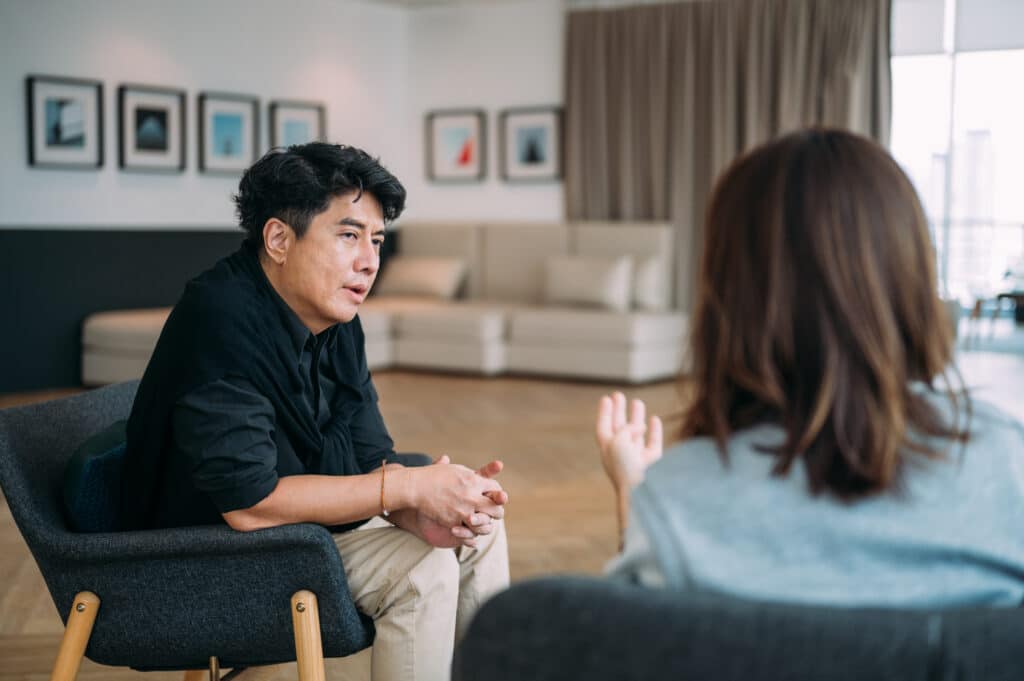

What Causes Social Anxiety?
Social anxiety disorder can negatively impact your life in many ways. Read on to learn about the causes, symptoms, and treatment options.
Table of Contents
What Is Social Anxiety Disorder?
Social anxiety disorder, also known as social phobia, is a long-standing and overwhelming fear of social situations. It involves an extreme fear of being judged, negatively evaluated, or rejected in a social or performance situation.
Prevalence of Social Anxiety
Social anxiety is a common mental health condition. According to the National Institute of Mental Health, about 12% of U.S. adults experience social anxiety disorder.2
When Does Social Anxiety Become a Problem?
Untreated social anxiety in public becomes a problem when it interferes with a person’s lifestyle, relationships, and well-being. The line between normal shyness and social anxiety disorder can be blurry.
What Are the Signs and Symptoms of Social Anxiety Disorder?
There are several signs and symptoms to look out for when diagnosing social anxiety disorder. These symptoms can be physical, emotional, or behavioral.3
Physical Symptoms
- Blushing: A person dealing with social anxiety in public may experience excess blushing or redness of the face. This uncontrollable symptom has to do with discomfort and fearful feelings surrounding social situations.
- Fast Heartbeat: When experiencing social anxiety, your heartbeat might quicken. This is a part of the body’s natural “fight or flight” response to stressful situations. It can feel as if your heart is racing or pounding
- Trembling: Trembling or uncontrollable shaking is a common symptom found in people dealing with extreme social anxiety. This might affect your hands, voice, or other parts of your body. The more you focus on it, the more pronounced the trembling can become. It’s a direct result of the heightened state of nervousness or stress that social situations can induce in individuals with social anxiety.
- Sweating: A person enduring an anxiety attack may experience excess sweating, regardless of body temperature. This sweating is a bodily reaction to the fear and nervousness associated with anxiety disorders.
- Upset Stomach or Nausea: An upset stomach or nausea is another physical symptom of social anxiety disorders. This happens because anxiety and stress can have a direct impact on gastrointestinal function. You may feel queasy or experience a churning sensation in your stomach during anxiety-inducing social situations. In some extreme cases, you may feel the urge to vomit.
Emotional and Behavioral Symptoms
Fear of Situations in Which You May be Judged Negatively
Worry About Embarrassing or Humiliating Yourself
Intense Fear of Interacting or Talking with Strangers
Feeling an intense fear of interacting or talking with strangers is a strong indicator of social phobia.
The thought of initiating a conversation, or even just being involved in one, can cause significant stress.
Afraid That Others Will Notice Your Anxiety
What Causes Social Anxiety Disorder?
Inherited Traits
A person can be genetically predisposed to mental health disorder.s If you have relatives who have been diagnosed with an anxiety disorder, you have an increased risk of receiving the same diagnosis.
Brain Structure
Environment
If you’ve had negative social experiences, especially ones that induce trauma, you might be more likely to develop anxiety in social settings. This could include being bullied, teased, or simply feeling left out.
Risk Factors of Social Anxiety Disorder
Family History
Negative Experiences
Temperament
New Social or Work Demands
Chronic Medical Conditions
Complications With Social Anxiety Disorder
Low Self-Esteem
Trouble Being Assertive
Negative Self-Talk
Hypersensitivity to Criticism
Poor Social Skills
How Can I Support Myself and Others With a Social Anxiety Disorder?
Educate Yourself
Educating yourself about the symptoms and treatment of social anxiety disorder is an excellent way to show support for yourself or a loved one who was recently diagnosed. You can also educate yourself on social anxiety coping skills to learn how to overcome the disorder better.
Communicate
When to Get Professional Help
Social Anxiety Disorder Treatment
Medication
Social anxiety can cause an imbalance in brain chemicals associated with mood and fear. Medication works by restoring the balance of these chemicals, helping to reduce feelings of anxiety and fear. Several different medications are available for people dealing with social anxiety disorder.
- SSRIs: Selective serotonin reuptake inhibitors (SSRIs) are the most frequently used drug for overcoming social anxiety. They help by increasing the levels of serotonin in your brain, which can improve mood and reduce anxiety.
- Upset Benzodiazepines: Benzodiazepines can also provide quick relief from acute symptoms of anxiety. They help to calm the body and mind by slowing down the nervous system.
Side Effects of Medication
Therapies
Types of Therapy Used for Social Anxiety Disorder

Reach Out to J. Flowers Health Institute for Specialized Social Anxiety Support
Our Approach to Anxiety in Social Settings
- Medical evaluation
- Psychological diagnostic testing
- Psychiatric evaluation
- Neuropsychological testing
- Lifestyle assessment
- Specialty physicians consult
- Spiritual consult and assessment
- Nutritional and fitness evaluations
- Comprehensive report and action plan
Alleviating Social Anxiety with J. Flowers Health Institute
Reach Out and Begin Healing
Let us help you overcome your mental health symptoms and begin to enjoy life again. Contact us today.









